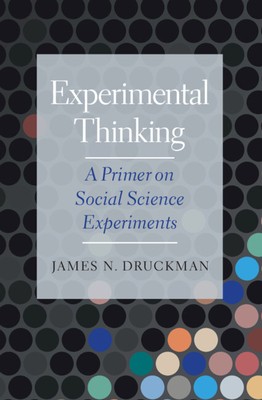
- We will send in 10–14 business days.
- Author: James N Druckman
- Publisher: Cambridge University Press
- ISBN-10: 1108994067
- ISBN-13: 9781108994064
- Format: 15.2 x 22.9 x 1.3 cm, minkšti viršeliai
- Language: English
- SAVE -10% with code: EXTRA
Reviews
Description
Experiments are a central methodology in the social sciences. Scholars from every discipline regularly turn to experiments. Practitioners rely on experimental evidence in evaluating social programs, policies, and institutions. This book is about how to "think" about experiments. It argues that designing a good experiment is a slow moving process (given the host of considerations) which is counter to the current fast moving temptations available in the social sciences. The book includes discussion of the place of experiments in the social science process, the assumptions underlying different types of experiments, the validity of experiments, the application of different designs, how to arrive at experimental questions, the role of replications in experimental research, and the steps involved in designing and conducting "good" experiments. The goal is to ensure social science research remains driven by important substantive questions and fully exploits the potential of experiments in a thoughtful manner.
EXTRA 10 % discount with code: EXTRA
The promotion ends in 23d.05:55:44
The discount code is valid when purchasing from 10 €. Discounts do not stack.
- Author: James N Druckman
- Publisher: Cambridge University Press
- ISBN-10: 1108994067
- ISBN-13: 9781108994064
- Format: 15.2 x 22.9 x 1.3 cm, minkšti viršeliai
- Language: English English
Experiments are a central methodology in the social sciences. Scholars from every discipline regularly turn to experiments. Practitioners rely on experimental evidence in evaluating social programs, policies, and institutions. This book is about how to "think" about experiments. It argues that designing a good experiment is a slow moving process (given the host of considerations) which is counter to the current fast moving temptations available in the social sciences. The book includes discussion of the place of experiments in the social science process, the assumptions underlying different types of experiments, the validity of experiments, the application of different designs, how to arrive at experimental questions, the role of replications in experimental research, and the steps involved in designing and conducting "good" experiments. The goal is to ensure social science research remains driven by important substantive questions and fully exploits the potential of experiments in a thoughtful manner.


Reviews